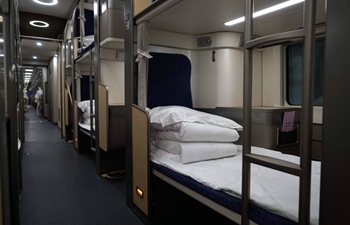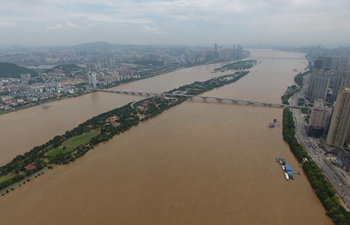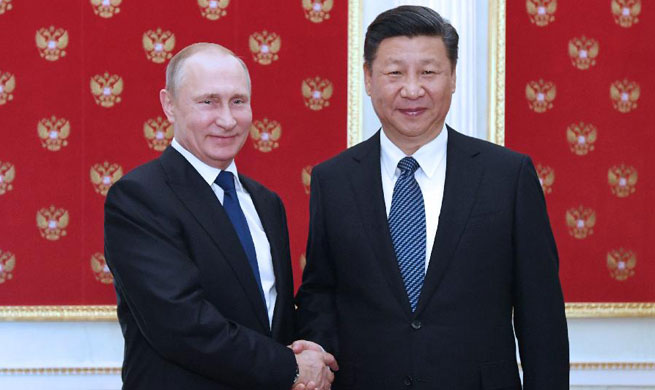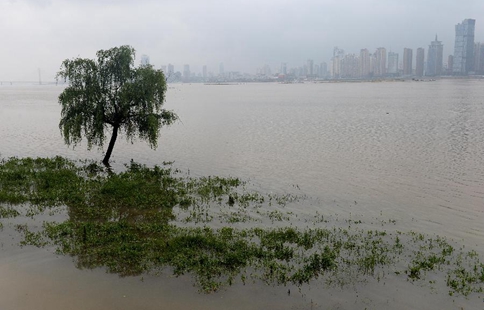by Saud Abu Ramadan
GAZA, July 4 (Xinhua) -- Kholoud al-Hamoud, a 40-year-old Syrian mother, from the southern Syrian town of Daraa, has spent the last two years laying on a bed at al-Wafa Hospital in southern Gaza City, suffering from relaxation in her nerves, weakness in her lungs muscles and inability to move.
Al-Hamoud, who is married and has a daughter and four sons, was born in a small town close to Damascus in 1977; after getting married, she moved to live in Daraa. She told Xinhua "I came to Gaza with my family after the situation got worse and dangerous due to the war that broke out in Syria in 2011."
"When the Syrian army bombarded Daraa, we escaped to Damascus and spent three days, then we flew from Damascus to Cairo," she said, adding "we stayed six months in Cairo, then we came to Gaza and since then we have been living here."
Gaza Ministry of Social Affairs said in Gaza, there are eight Syrian families, a total of 32 people, including men, women and children. The statement said that some of the children were born in Gaza after their arrival in 2011, and all of them are either having invalid Syrian passports or no documents.
"I came to Gaza with my wife Kholoud through Rafah crossing on the borders between Egypt and Gaza Strip because we have Syrian passports, but we brought our five children into Gaza through a tunnel underneath the borders," said Aamer Foura, a 43-year-old Syrian, the husband of al-Hamoud.
Foura and his sons stood close to the bed of al-Hamoud, trying to explain to her that the doctors in the hospital are exerting a big effort to take her to a hospital in the West Bank or in Israel for urgent medical treatment, adding that "we came here thinking that the situation in Gaza would be better than in Syria."
"Unfortunately, when we arrived in Gaza, the situation got worse and worse," said Foura. "We are stuck here and unable to go anywhere; we witnessed an Israeli war on Gaza in 2014, and now we share the people the outcomes of the Israeli blockade and the severe shortage of electricity."
Israel has been imposing a tight blockade on the Gaza Strip since Hamas movement seized control of the enclave in 2007 and restricted the movement of goods as well as the movement of more than 2 million people. Since then, Israel waged three offensives on Gaza, and the largest was in the summer of 2014.
"I escaped from Daraa with my wife and children after seven of my relatives were killed in the bombings," said Foura, adding "if I knew the situation will be like that in Gaza, I would have changed my mind and gone to Turkey or Europe instead."
His wife said with tears in her eyes "I call on the United Nations Commission for Refugees to intervene in as immediately as possible to rescue our lives and take us out from here."
"Since we came to Gaza, until now, no one had helped. My dream is to leave Gaza and go for urgent medical treatment abroad," she added.
Wareef Qassim Hamido, a 35-year-old Syrian refugee, and 11 million others, were forced to flee their homes when anti-government protests swept Syria in 2011. Qassim, a talented chef, who fled the Syrian city of Aleppo to Turkey and then to Egypt, has found love and career in Gaza.
"There was no food, no electricity," he told Xinhua. "At some point, you have to make a decision even when it's impossible." In 2012, Wareef fled his home town Aleppo to Turkey, he stayed there for a while until a friend told him of a job at a restaurant in Cairo.
So he left Turkey to Egypt by sea. He spent eight months in Cairo, however, poor working conditions in Cairo made him think twice that he should leave. Left with only two options, either to take a smuggling boat to Europe or to go to Gaza to work at the restaurant of a Palestinian friend that he met in Cairo.
Hamido rolled a dice and decided to move to the Gaza Strip, a place he only knew through news headlines. In May 2013, he arrived in the narrow enclave through one of the underground tunnels that linked Egypt with the blockaded territory.
He said that his family did not know he was in Gaza after four months since he settled down there. He started working at his friend's restaurant, and became a famous chef that Gazans crossed ways to taste his delicious food, especially the dish of minced beef or lamb and wheat (burghul), his specialty.
In Gaza, Hamido found love at first sight. He met with Maha Abul Kas, a Palestinian journalist who interviewed him for a story on Syrian refugees in Gaza. Wareef and Maha got married eight months before Israel launched its last summer war on Gaza in July 2014.
In September, their first baby girl was born. Wareef and Maha wanted to give her the name of either a Syrian or a Palestinian city that matches a girl's name, and they called her Eilyaa which means Jerusalem.
His Syrian passport has expired, and renewing it at an embassy or consulate in Gaza is not an option, nor is leaving. He can't even get a Syrian passport for his newly born daughter either.
All what Hamido dreams of now, is to get a Syrian passport for his daughter. He has made a promise to his daughter that one day he will show her every inch in Aleppo, and tell her every story about his village.

















